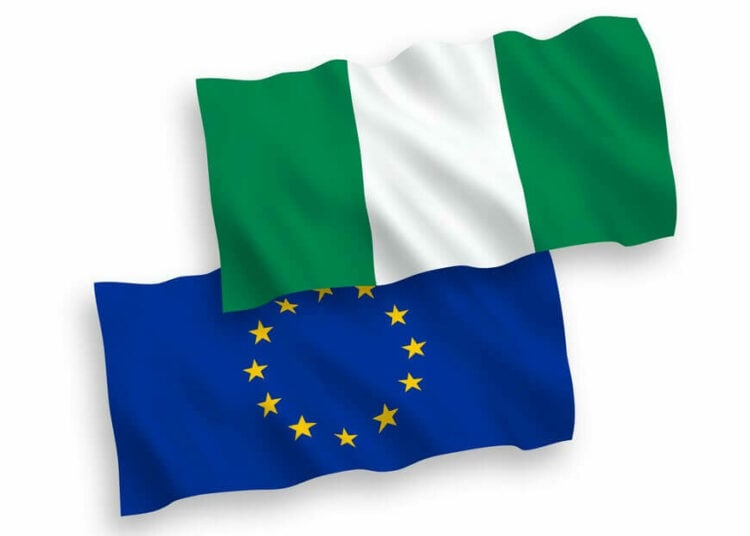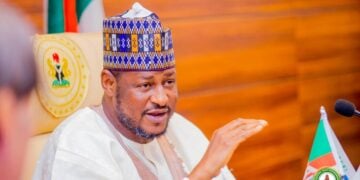The federal government, in collaboration with the European Union (EU) and ECOWAS, on Thursday signed three landmark agreements towards strengthening local manufacturing and attracting investment across Nigeria’s pharmaceutical and health sectors.
The agreements, which are part of the EU Global Gateway Manufacturing and Access to Vaccines, Medicines, and Health Technologies (MAV+) initiative and SRHR flagships, will support a new generation of local producers and innovators in building a stronger and more resilient health ecosystem across Nigeria and West Africa.
The three agreements include: Enabling Local Manufacturing of Health, Immunisation and Nutrition Commodities in Nigeria (ELM-N); Quality Uplift for Advancing Local Industry in Medicine Standards (Qualimeds Nigeria); and Strengthening Reproductive Health and Rights (SRHR) in West Africa.
Speaking at the Nigeria–EU Health Investment Forum held in Abuja and jointly hosted by the EU Delegation to Nigeria and ECOWAS, the Presidential Initiative for Unlocking the Healthcare Value Chain (PVAC), and the National Institute for Pharmaceutical Research and Development (NIPRD), Vice President Kashim Shettima reaffirmed the Federal Government’s commitment to building a sustainable, inclusive, and innovation-driven health economy.
Represented by his Senior Special Assistant on Public Health, Dr Uju Rochas, the Vice President commended the agreements as a continuation of President Bola Tinubu’s Executive Order promoting local production of pharmaceuticals and medical devices—a turning point for Nigeria’s healthcare sector.
“Through the Presidential Initiative for Unlocking the Healthcare Value Chain (PVAC) and complementary frameworks such as the Sector-Wide Approach (SWAp), this administration has taken concrete steps to strengthen health governance, stimulate investment, and promote local manufacturing,” he stated.
Shettima reiterated the government’s resolve to foster an enabling environment for investors and innovators through stable regulations, robust institutions, and effective public–private partnerships.
“Our message is clear: Nigeria is open for health investment, innovation, and impact. The President has made it clear that Nigeria’s health transformation will not depend on aid and dependency alone but will be driven by local ownership, accountability, and innovation—Made in Nigeria, for Nigerians, by Nigerians,” he added.
Commending the EU, PVAC, NIPRD, and other partners for their commitment to advancing health security, technology transfer, and industrialisation, he described the signing as “the beginning of a new chapter defined by shared prosperity, local innovation, and global collaboration.”
EU Ambassador to Nigeria and ECOWAS, Gautier Mignot, noted that the forum reflected Team Europe’s shared commitment to improving health outcomes through strategic investment.
“Together with our partners, the Nigerian government, the United Nations, the private sector, and the wider international community, we are committed to building resilient, efficient, and inclusive health and social welfare systems to ensure prosperity for all,” Mignot said.
He highlighted the EU’s long-standing partnership with Nigeria and ECOWAS in advancing healthcare—from access to services and large-scale immunisation to medical research, family planning, and disease eradication—through both national and multilateral initiatives.
“We continue to support Nigeria through our Global Gateway initiatives, particularly in reproductive, maternal, and child health. We currently have a €45 million project in Nigeria and nearly €25 million across West Africa, co-funded with the Agence Française de Développement (AFD) and the Gates Foundation. Our goal is to move from aid to peer-to-peer collaboration, from standalone projects to a dynamic investment strategy, and that’s the essence of our Global Gateway Investment Strategy,” Mignot explained.
In his remarks, the Minister of Budget and Economic Planning, Senator Abubakar Bagudu, stated that the forum comes at a pivotal time as Nigeria expands partnerships, reforms its systems, and increases investment to make healthcare more accessible and affordable.
“This is about mutual prosperity and shared gains. The absorptive capacity of Nigeria’s economy is enormous, and the political determination to get it right is clear. President Tinubu has taken bold, necessary reforms to set our economy on the right path,” he said.
Also speaking at the event, the Minister of Health and Social Welfare, Prof. Muhammadu Pate, was represented by Pharm Olubunmi Aribeana, who reiterated Nigeria’s commitment to ensuring that locally made health products serve not only its citizens but also the wider West African region and beyond.
“Nigeria’s Renewed Hope Health Agenda is anchored on three pillars: strengthening local pharmaceutical production; expanding access to essential medicines and vaccines; and advancing sexual and reproductive health and rights. Local manufacturing of health commodities is not just an economic strategy; it is a critical component of our national health security,” he noted.





